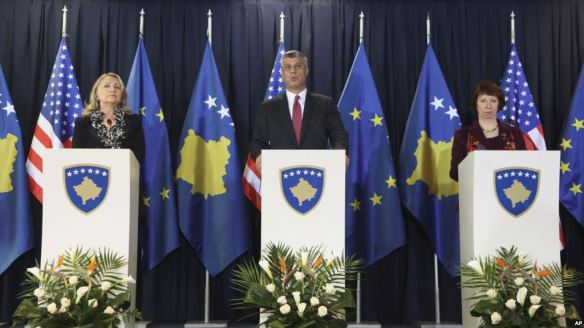The title of this blog is a question I’ve often heard during my 3 months in Kosovo. Placed with the Kosovo’s Ministry of Local Government in the Department of European Integration and Policy Coordination, I’ve often introduced myself and shortly thereafter am asked a question to the effect of “but wait, you’re an American. Why are you working on European Integration”. The quick answer is that I am a self-proclaimed Europhile and supporter of the European agenda. But the longer answer is that the concept of “European integration” is something not so foreign to Americans. I’d argue it’s something quite familiar.
The term “European integration” seems to have turned into an entity of its own here in Kosovo, as I’m sure it has in many countries as they prepare for accession talks. Kosovo recently finalized the Stabilization and Association Process Dialogue (more quickly than any other country seeking to join the EU) and as of August 2014 has initialed its Stabilization and Association Agreement. Now, they are awaiting final approval once the newly formed government is confirmed. This means that the time for the real work of implementing all the necessary measures is now. The EU Commission provides constant feedback on Kosovo’s progress, and published an annual progress report summarizing each country’s efforts. In Kosovo, an entire Ministry was recently created for European Integration, and each of the 17 other ministries have an entire department for European Integration. Further, each of the 38 municipalities is required to have an officer for European Integration. So what are all these bodies and representatives doing in their quest for “European integration”?
My answer would be that they are supporting good governance efforts, pushing for increased transparency, enhancing safety and security, developing quality education and cultural institutions, supporting economic development and the rule of law, etc, etc. Sounds a lot like the same responsibilities that every government around the world is obliged to work towards to support their citizens, doesn’t it? Often, this idea of European integration is seen as a job separate from the daily work of government. When in actuality, the work necessary to support European integration is to move institutions towards good governance as a whole. Technically, there are 35 chapters (or policy fields) for negotiation, requiring endless legal harmonization and policy reform but perhaps it is more harmful than helpful when we make “European Integration” into an entity in and of itself. From my perspective what the EU wants to see countries achieve prior to granting accession is fairly simple; a well-governed state and infrastructure and institutions developed for a prosperous functioning economy with quality opportunities for its citizens. Sure, that is oversimplifying the matter, but European integration should result in tangible impact for citizens. It means all Albanian, Serbs, Roma, Bosniaks and others nationalities living in Kosovo have equal access to education. It means contracts are upheld and enforceable. It means governments are accountable to the citizens they serve. And most importantly, it means that government, business and civil society have the capacity necessary to operate and contribute to a vibrant public sphere. These things are something every developed country in the world has worked through, and good governments continue to review and improve. The US, despite being a global leader in many areas, is not perfect, and our country still combats these challenges on a daily basis. The perspective I bring to Kosovo is the experience and best practices developed in the US in the 238 years since our country was founded.
Another aspect of European integration and the design of the European Union is the idea that together they are better off and stronger working together than seperately. Despite differences among the 50 states that comprise the United States of America, the concept that we are better and stronger together than we are apart rings true each and every day. Yes, California is the 10th largest economy in the world, but the combination of 50 states with unique geographic advantages, cultures and histories and industries is what makes America America. As the Latin phrase on each of our dollar bills proclaims “E Pluribus Unum” or out of many one, our many distinct characteristics is what comprises the character and strength of the US. Similarly, the rich cultures, human resources and economies of each EU country, large and small, will make the European Union a dynamic, prosperous block. Italian Prime Minister, Matteo Renzi, recently stated that Italy will push for the “United States of Europe” during their 6-month rotating presidency of the EU. He stated “that a stronger and more cohesive Europe is the only solution to solve the problems of our time”, Mr Renzi said “For my children’s future I dream, think and work for the United States of Europe.” As an American, this concept of shared prosperity is something I know a little something about, and something worth working towards for Kosovo.
The European Union offers Kosovo the biggest symbolic carrot to implement good governance systems. Despite that, I’ll continue to argue that Kosovo must implement reform as much for it’s own prosperity as a viable country as it does to meet the requirements of joining the EU. So, now more than ever is the time for Kosovo to get to work, not only to please the EU, but to please the country’s 1.8 million citizens.
By Micaela Thurman
Fulbright Clinton Fellow – Pristina, Kosovo

